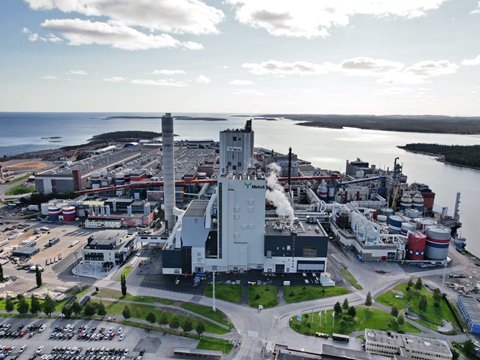
Metsä Board has revealed the upgraded folding boxboard machine at its integrated board and pulp mill in Husum, Sweden; it is reported to run with 98% renewable energy and offer an increased annual capacity of 600,000 tonnes.
Folding boxboard, uncoated white kraftliner, and bleach chemical pulp are all produced at the mill. These are intended to serve as alternatives to fossil-based materials in consumer packaging, with the mill’s main markets located in Europe and North America.
It is claimed to be one of the Örnsköldsvik municipality’s largest employers and contribute to the large-scale transition into a bioeconomy.
A new folding boxboard machine, BM1, was established in Hunsum in 2016, said to offer a capacity of 400,000 tonnes every year. Since then, an extensive investment programme saw the establishment of a new recovery boiler and turbine with a €380 million investment in December 2022; this was expected to increase biobased energy production and energy efficiency in pursuit of Metsä Board’s goal of achieving fossil-free mills by the end of 2030.
In 2023, a €230 million investment was completed to boost the mill’s capacity up to 600,000 tonnes – reportedly making it ‘the largest and most modern of its kind’. As well as an upgrade to the entire board mill, the project has also increased the warehouse capacity at the port.
This involves an extension of the board machine’s drying section, a new winder, and an automated reel handling system.
“The combination of most modern available technologies with a very high degree of automation solutions gives us both a safer mill as well as lots of new improvement opportunities,” states Olov Winblad von Walter, VP Husum Board and Pulp Mill.
The move is expected to help the company meet increasing demand for sustainability-minded packaging materials in line with the pursuit of a circular economy. Project partners and representatives of the Örnsköldsvik municipality, Swedish parliament, and forest industry players were invited to the inauguration ceremony.
“With the investment in the folding boxboard capacity at Husum, Metsä Board is well positioned to meet the growing demand for fibre-based packaging materials,” says Mika Joukio, CEO of Metsä Board. “We are dedicated to supporting our customers with high quality and resource-efficient solutions that help replace fossil-based materials and support the circular economy.”
Late last year, operations commenced at Metsä Group’s bioproduct mill and paperboard mill expansion in Kemi, Finland. The mill was reported to produce 1.5 million tonnes of softwood and hardwood annually using zero fossil fuels, utilizing all raw material and production side streams as bioproducts or bioenergy in a bid to become waste-free by 2030.
An ongoing demonstration phase has also led the Group to consider the feasibility of a commercial-scale factory for its Muoto wood fibre products through a pre-engineering project. This step is anticipated to give customers access to renewable and recyclable alternatives to plastic food packaging.
In other news, DS Smith recently announced its multi-year £48 million investment in a new fibre preparation line at its paper mill in Kemsley, England; it is expected to deliver returns by improving efficiency and lowering costs.
If you liked this story, you might also enjoy:
Report: The ultimate guide to global plastic sustainability regulation
The Brief: Oxo-(bio)degradables: the who, what, and why of breaking down fossil-based plastics
Sustainable Packaging Summit: How Kraft-Heinz uses collaboration to drive innovation
The Brief: Using ocean-bound plastic in packaging – how, why and should we?














No comments yet